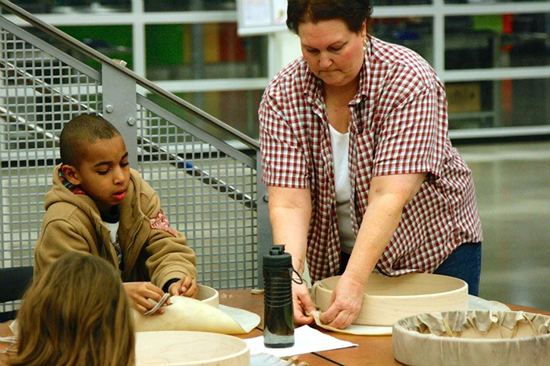
- Courtesy Photo. Margit Moore, a volunteer with Eastside Native American Education Program, helps a young student learn how to make a drum as part of the program’s annual event focusing on Native American culture.
By Shannon Michael, NWNews.com
It has been 30 years since the Eastside Native American Education Program (ENAEP) was formed in 1974 by the Lake Washington School District.
Since the initiation of the Indian Education Act of 1972, the federal government has assisted local school districts in funding educational programs for all Native American, American Indian and Alaskan Native children, according to the LWSD website.
Shortly after forming, the Bellevue and Northshore school districts joined the program that assists Native American, Alaskan Native and American Indian students and their families in grades K-12.
A student, or parent or grandparent must be an enrolled member of a Federally Recognized band or tribe in order to enroll in ENAEP.Families with students in these districts have two opportunities a year to enroll in the program. In the Northshore School District, 89 students and their families are currently enrolled, according to Linda Hoste, Title III director that helps coordinates with the program for Northshore students.
“The biggest benefit we see from students participating in the program is the connection to their native culture. It builds self-esteem, and the academic support gives them success,” Hoste said.
ENAEP offers a wide-ranging selection of activities and resources to participants at the weekly Monday evening meetings held at Lake Washington High School.
Students and families who attend the meetings are offered resources such as homework support, mentoring, referral services for social services, advocacy, test preparation classes, job shadowing opportunities, and at least one major annual event that highlights their native culture.
Overseeing ENAEP is Mary Wilber, a member of the Okanagan Nation. She is the Native American education coordinator for the Lake Washington, Bellevue, and Northshore districts. “On average, we have about 30 students and their families attend the weekly meetings,” she said.
This year’s major cultural event organized by volunteers is drum making, which has been well attended. “Students are learning six to seven traditional songs that they can sing using their drums,” she added. Fifty-seven students and their families have participated in the drum making event, she said.
While homework support is one of the most important priorities at the weekly meetings, so is the “Know the Facts” segment where volunteers teach Native American history not taught in the classroom. “We don’t duplicate, but supplicate what is taught in schools,” Wilber said.
Another component of the program is to guide older students to become mentors to the younger students. “We have former students now in college locally who still come to the meetings to tutor younger students,” Wilber said.
Next up for participants in ENAEP is an indigenous food demonstration on March 31 at 21 Acres in Woodinville. “We are excited to partner with 21 Acres,” Wilber said.
In addition to providing support to students and their families, ENAEP also provides support and training to teachers. They provide curriculum workshops on the Washington State Tribal Sovereignty Program to K-12 social studies teachers as part of a state bill passed in 2005 encouraging all schools to teach Washington State Tribal History in public schools.
Hoste added that they’ve provided cultural awareness training for teachers, as well.
Because ENAEP is federally funded, annual assessments of how the funding is being used to meet the program’s goals is required as part of the annual grant received by the government.
For more information about ENAEP, contact Mary Wilber, MWilber@lwsd.org or (425) 936-1402.
